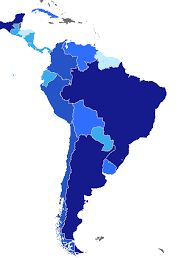This blog was last updated on February 2, 2024
The rate of change of business-to-government compliance mandates in Latin America continues compounding, with no less than 10 (ten!) new regulations expected in 2016. Managing these changes can be challenging at all levels of a corporation – from IT integration to new processes and controls in finance and supply chain management to operational delays and financial penalties that directly impact the C-suite. And these are issues faced with just a single regulation change! Now that companies operating in Latin America are looking at as many as 10 new mandates this year, it’s time to critically assess your compliance solution to ensure that these transitions are as seamless as possible.
Below is a quick overview of the mandates multinationals need to pay attention to this year.
 Brazil
Brazil
- SPED FIsccal Bloco K (Bloco K): In a significant expansion to its reporting requirements, Brazil will require companies to submit monthly inventory and production reports. Although it recently shifted the first implementation deadline back to January 1, 2017, this new mandate will require complex changes to many corporations’ tax accounting and reporting process that need to be addressed long before the deadline hits.
- eSocial: Employers in Brazil will now be required to submit all labor, social security, tax and fiscal information related to hiring and employment practices. This mandate goes into effect in September for companies with revenues exceeding $78 million USD and in January 2017 for all other enterprises.
Download Brazil mandate checklist
Colombia
- Following the multitude of Latin American countries that have increased tax collections through e-invoicing, Colombia is now mandating similar measures. The mandate will affect over 50,000 companies through 2016. Technical specifications were released this week. Contact us for details.
Download Colombia mandate checklist
Peru
- Starting in January 2016, Peru added six new electronic reporting requirements, in addition to e-invoicing, required by companies with revenues greater than $3.69 million USD.
- In July 2016, approximately 12,000 companies will be added to Peru’s electronic invoicing requirement.
- In December 2016, another 500 companies will be required to adopt electronic invoicing.
Download Peru mandate checklist
Uruguay
- Uruguay has introduced a more structured approach to mandated e-invoicing, with all companies with revenue equal to or greater than ~$3.1 million USD required to adopt electronic invoicing by June 2016. Previously, the government individually notified mandated taxpayers, but is now standardizing the process.
- Companies with 2015 revenue equal to or greater than ~$1.5 million USD must adopt electronic invoicing by December 2016.
Download Uruguay mandate checklist
Ecuador
- In response to complaints that obtaining government approval prior to shipping was delaying business operations, Ecuador is moving its e-invoicing to an “offline” process – providing a 24-hour buffer for companies to submit e-invoices and no longer requiring an approval code to ship.
Download Ecuador mandate checklist
Mexico
- Mexico is expected to introduce an updated XML schema (version 3.3) in 2016, which will likely require new customizations within your ERP.
Download Mexico mandate checklist
It’s no secret that regulations change swiftly in Latin America, but seeing all of these changes in one place may seem daunting – especially since it’s still just the first quarter. Now is the time to evaluate a more proactive compliance solution – one that keeps your company ahead of changes and identifies areas for innovation in the face of these complex mandates. For a more detailed analysis of how these new regulations may affect your business and how you can proactively address them, contact us.